A sweet man of peace, The Rag Blog’s David
MacBryde passed away in Berlin, Wednesday, September 9.
AUSTIN — I lost a dear friend last Wednesday and The Rag Blog lost its “man in Berlin.” David MacBryde, a warm and funny man who played an important role in the struggle for peace and justice in ‘60s and ‘70s Austin — and was a contributor to Austin’s original underground newspaper, The Rag — died of cancer, September 9, 2015, in Berlin, where he had been living since 1981.
David, who had roots in the Quaker Church and continued his social activism through all his years in Germany, studied physics and mathematics at Yale and philosophy at the University of Texas at Austin. He was active with the Students for a Democratic Society (SDS) and Austin’s Armadillo Press, an IWW print shop. He was a UT shuttle bus driver and helped organize a militant drivers’ union.
In Germany, David worked with the “Swords to Plowshares” movement in a program to convert military bases to peaceful civilian use, and with the anti-war American Voices Abroad in Berlin, among many other projects. And as our Berlin correspondent, he graced The Rag Blog with his frequent dispatches. (Find David MacBryde’s Rag Blog articles here).
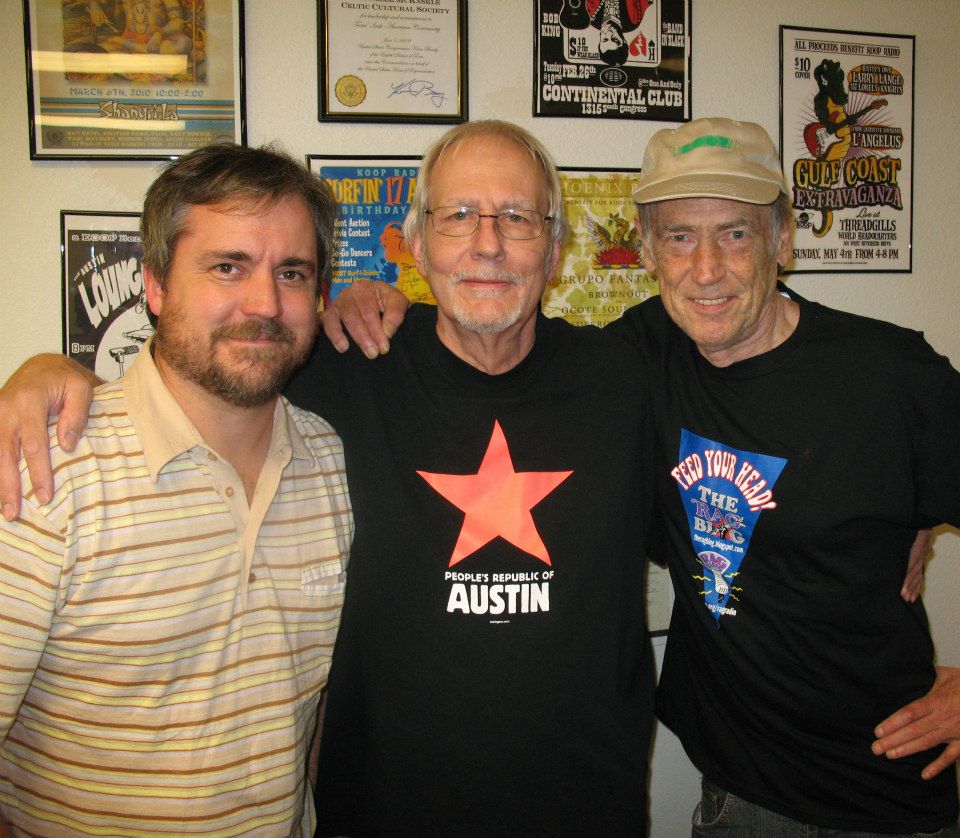
David, on the right, with Rag Radio’s Tracey Schulz, left, and Thorne Dreyer. Photo by Charlie Martin / KOOP Radio.
David visited often, was a part of the highly successful Rag Reunion in 2005, and was here when we had a lively Rag Blog gathering at Maria’s Taco Xpress in November 2012, that doubled as a “David MacBryde UT Shuttle Bus Drivers’ Reunion.”
During that trip David and I spent an enjoyable hour reminiscing and pontificating in front of the KOOP mics. He enlightened our listeners with a progressive perspective on developments in Germany and the Eurozone. David had also just attended a conference in Ann Arbor, Michigan, honoring the 50th anniversary of SDS’ landmark manifesto, the Port Huron Statement, and he discussed how the SDS concept of “participatory democracy” had influenced his life and his politics.
You can listen to the podcast of my Rag Radio interview with David MacBryde, here.
Hugh Grady has written a wonderful remembrance of David (below) and we also invite his old friends, colleagues, and co-conspirators to offer their memories in the comment section below the article.
Sabine Sawitzki, David’s partner, has asked that, in lieu of flowers, memorial contributions be made to benefit the Salon at Schloss Wartin. Contact editor@theragblog.com for further information.
Thorne Dreyer
Editor, The Rag Blog
Remembering David MacBryde,
June 19, 1942-September 9, 2015
David MacBryde passed away in Berlin, where he had been living since the 1980s, from cancer on Sept. 9, 2015. He was a man of convictions and ideals who dedicated his life to following them. He was a philosophy student who left graduate school to become what he liked to call “a professional revolutionary,” following Marx’s dictum that, “The philosophers have only interpreted the world in various ways. The point, however, is to change it.”
Many readers of The Rag Blog will remember Dave from his long residency in Austin during the heyday of the New Left movement of the late 1960s through the 1970s. He had been active in Austin SDS (Students for a Democratic Society) until it dissolved in 1969 and afterwards was a member of the Austin chapter of New American Movement during the entirety of the 1970s. He also was a member of the Shuttle Bus Drivers Union and worked as well with the Latin American Policy Alternatives Group (LAPAG) and in many, many, shorter term projects and groups.
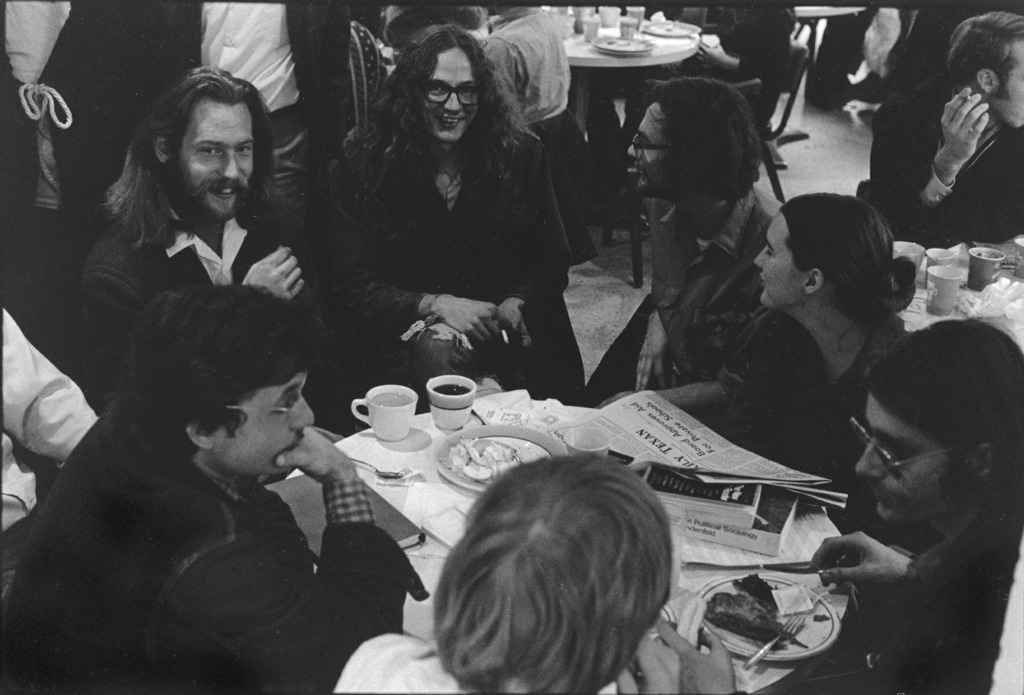
Activists in the Chuck Wagon at UT-Austin, probably 1969 or ’70. David MacBryde is at rear left. Photo by Alan Pogue / The Rag.
I met David sometime during my first two years in Austin, 1971-1972. I came to UT to go to graduate school, but having been a witness of the great upheavals in France of May-June 1968, I wanted to find a way to be politically active in Austin while I studied. Inspired by the French student movement I became a member of Fordham SDS my senior year at college, and a year later as a VISTA volunteer in Houston with my wife Sue Wells, I occasionally wrote for the Houston underground paper Space City!
We arrived in Austin in the fall a year and a half after the great Cambodia protests had galvanized thousands and thousands of students nationwide and at UT-Austin in particular. Even though SDS was defunct, the national anti-war movement was still thriving, the Black Panther Party was serving thousands of breakfasts in its communities, and we thought the Movement, whether on or off-campus, had a bright future. We were thrilled that Austin was a large center of New (and old) Left activity with many different kinds of radicals to get to know and work with.
David was an intriguing person and played a great part in furthering my radical education.
David was one of the most intriguing people that I met, and he played a great part in furthering my radical education. He was a “cultural radical” who believed that the lifestyle changes associated with the youth culture of the 60s were important social and political developments that needed to be nurtured and preserved — an easy enough task in the Austin of that period, to be sure!
He thought that the American working class now extended far beyond the traditional blue collar precincts the term usually called up and that the cultural radicalization of working people of all sorts was the best hope for enlarging the Movement and ultimately creating a meaningful revolution that would not be just a change of rulers.
He thought that the advancements that feminism was making in those heady years were crucial ones and needed to be part of our politics. We became close friends when we each decided to join the new Austin chapter of New American Movement early in 1973.
He had a mischievous sense of humor along with his bedrock desire for social and political change.
David’s personality was subtle. He was quiet, at times even reserved, and he always kept a cool head at political moments of high heat — a very valuable trait. But he could be intense, and he had a mischievous sense of humor along with his bedrock desire for social and political change.
I remember one of the first times I saw him in action was at the infamous 1971 Party Where Men Wore Dresses, organized by one of the many feminist consciousness-raising groups of the time and a challenge to Movement men to show their politics by wearing women’s clothes to a political/social event aimed at educating all about the dynamics of gender roles and clothes.
Dave showed up in a great outfit and, always one to want to exploit new technology for the Movement, he carried a video camera to record the event for posterity. Oddly, that effort met with considerable hostility from some participants, and he had to give it up, which he did with good humor, but the effort and enthusiasm were completely typical of him.
I remember another occasion, when the first incarnation of Austin NAM was having hard times, and a scheduled chapter meeting was attended only by myself, Sue, and David. David was resolute in his conviction that the three of us should keep going and rebuild — and amazingly we managed to do so. A long story, but it wouldn’t have happened without him.
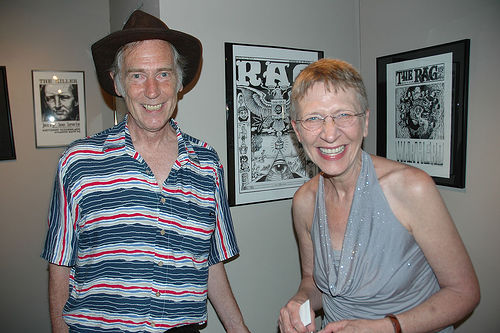
David with Sarito Carol Neiman, the original “funnella” of The Rag, at the Rag Reunion. Photo by Carlos Lowry / The Rag Blog.
In 1975, a revamped and revivified NAM chapter decided it was time to think about long-term projects with staying power that could draw involvement from students at UT and members of the larger Austin community. With the help of a friendly investor, we were instrumental (along with others, especially Billy Pope) in purchasing a house on San Gabriel Avenue (it has since been demolished) to create the Bread and Roses Center for Socialist Education.
He became the face of Bread and Roses and was one of the sources of energy behind it.
Bread and Roses needed a resident administrator, and characteristically, David volunteered for that role. He became the face of Bread and Roses and was one of the sources of energy behind it in its lifetime of five or six years. We offered classes on topics ranging from women’s health to introduction to Marxism, had numerous speakers, parties, meetings, art exhibits, singing nights, and fund-raisers that helped create a sense of hope and political activism in the second half of the 1970s.
That time of the 70s, when Dave and all the other activists of that period continued to carry the torch, now seems in hindsight a series of beautiful years of idealism. But they also leave bittersweet thoughts of the possibilities for a much more just and more humane American society. A different outcome from the one we live with now didn’t seem all that impossible in that time and place. We didn’t think revolution was imminent, but we were hoping to bridge the growing gap between the peak of New Left activism and something that we hoped would succeed it and be even bigger.
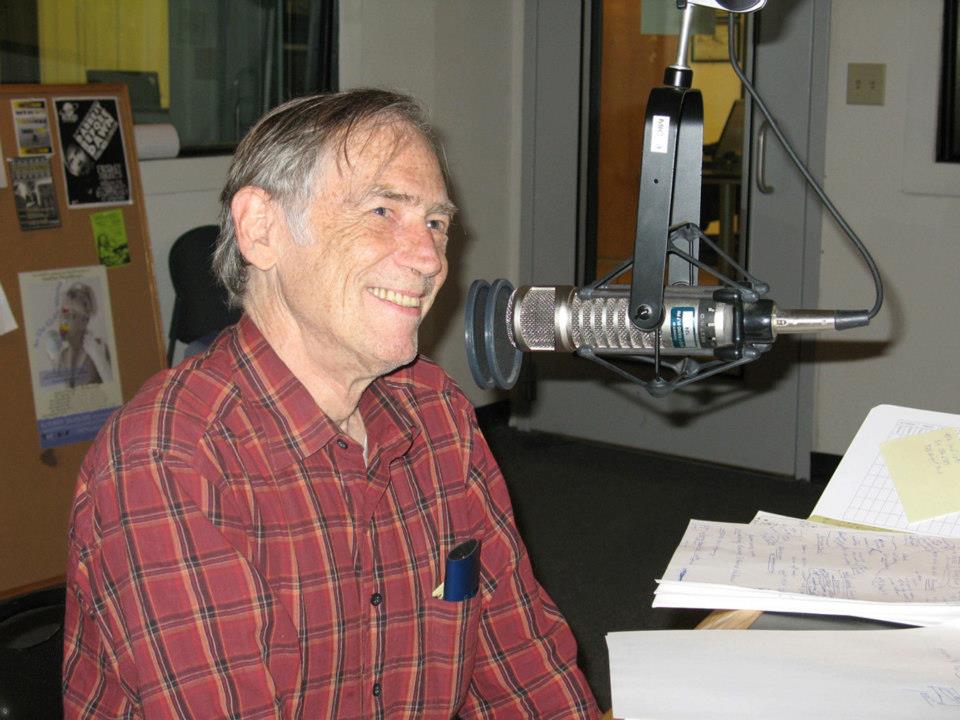
David on Rag Radio at the studios of KOOP-FM in Austin, November 10, 2012. Photo by Tracey Schulz / Rag Radio.
I often wonder what could have happened had not the rise of radical Islam in Iran and the hostage-taking of Americans there derailed the left-wing insurgency against the moderate policies of Jimmy Carter. Instead, conditions were created for the election of Ronald Reagan and a marked rightward shift in U.S. politics and culture. We have been living with it ever since.
Austin was a kind of golden afterglow following the tumultuous and scary late 1960s.
Austin in those years was a kind of golden afterglow following the apocalyptic rhetoric and practice of the tumultuous and scary late 1960s. It was a time for living our politics and trying to build for the long run. We had a great time — and so much fun. In many ways, speaking strictly for me, it was the best time of my life.
David was a huge part of that. He was a great comrade and morale-builder, just as he continued to be when he decided to build a new life in the New Left culture of Berlin, where he remained until his death.
I talked to him on the phone this last August, when I had finally heard about his bad diagnosis and prognosis. His spirits were high and he was of good cheer. “We all have to die of something,” he said. That was David. The world is a much poorer place without him.
[Hugh Grady was active in the Austin left from 1971 to 1978 as a member of Austin New American Movement (NAM) as he attended graduate school in the UT Comparative Literature Program. He has just retired from a college teaching career at Arcadia University and lives outside of Philadelphia, where he is doing writing and research.]

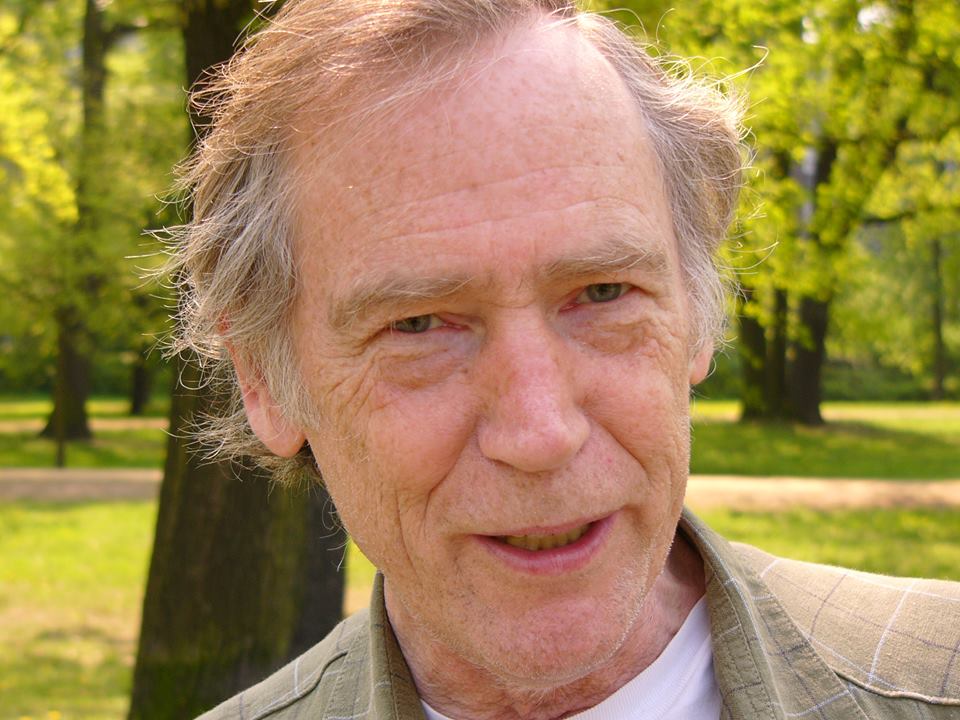
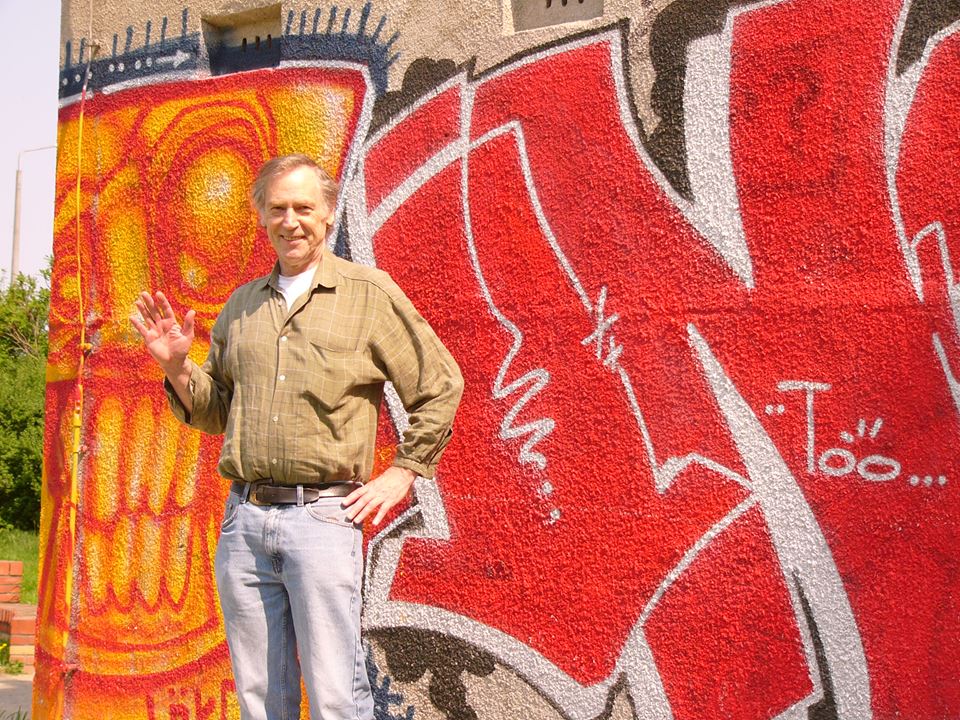
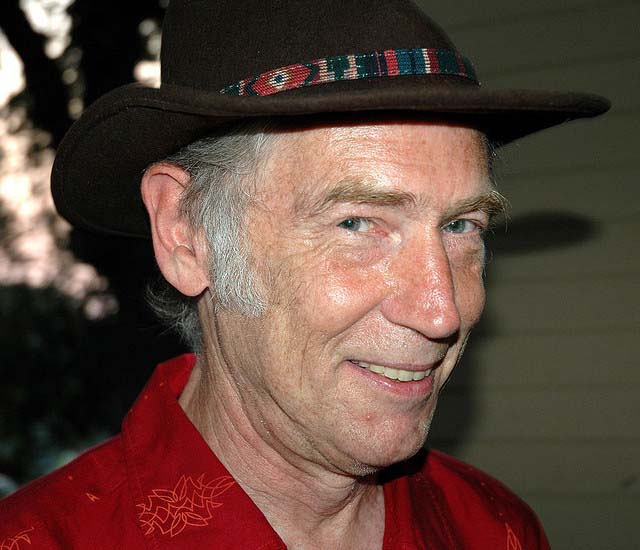

















David and his partner, Sabine, were gracious hosts in Berlin to a second generation – our children and our children’s friends. I am grateful that David was here for the 2005 Rag Reunion and then again for a Rag Blog & Shuttlebus Drivers reunion. When David learned of plans for the 2016 Rag Reunion, he commented on The Rag Blog, “I will be there whether live or in spirit.” He will be with us then. Many fond memories.
David and Billy Pope recruited me to teach a class on guerrilla theater at the Bread and Roses Center for Socialist Education before I left Austin for Los Angeles.
David believed very strongly in maintaining a counter culture by teaching each other alternative skills. He was endlessly optimistic and good humored.
The men in dresses party was initiated by leftist women and men trying to start discussions about male privilege in the greater society. As a gay man who had worn drag to classes to start discussion of male privilege, I was actually more nervous doing this that David was.
He grinned his way throughout, not making a joke out of it, but as Hugh says, with subtlety and warmth.
I got to know Dave MacBryde a little bit when I helped put together a flyer for the shuttle bus drivers union, and later got to know him well in his role as the live-in “face” of the Bread & Roses Center. Besides its many interesting classes, Bread & Roses offered a comfortable, homelike meeting place for small groups of all kinds to discuss all kinds of ideas and projects. David was the main reason that the “homelike” atmosphere was maintained at this essentially collective house, and never degenerated into the dirty and cluttered neglect that unfortunately typified many such places where “no one was in charge.” Without ever giving orders or acting like a big shot, David led by example, and cleaning up after yourself was part of his example.
When Mike Kleinman and I decided to launch the Phogg Phoundation for the Pursuit of Happiness in the late 70s upon the remnants of the non-profit Youth Emergency Service, Inc., David was one of our first choices for our new Board of Directors, and he stuck with the group until his move to Germany. He was such a joy to work with, whether out on the streets at our semi-annual street dance community fundraisers, selling T-shirts, pumping beer, and smiling at everyone who came by, or working through the details of upcoming plans at a meeting, he was totally present, in the moment, giving the effort his full attention and intellectual power.
I feel very fortunate not only to have known and worked with David in providing “good times for a better community,” but to have gotten to hear bits and pieces, at least, of his life in Germany, where his philosophical education and intelligence could at last achieve the respect they deserved. He was a wonderful friend and revolutionary comrade and I shall miss him.
I was Dave’s housemate at the Bread and Roses Socialist Center in 1979, the last full year of the center’s existence. I still miss those days in Austin and my New American Movement comrades. I remember Dave as one of the sweetest and most committed individuals I have ever met. My most unforgettable moment with Dave was in late 1989 in the lobby of a hotel in Starkville, MD. Dave was visiting from Germany and we had both just arrived for the Democratic Socialists of America national convention. As we stood there awestruck, the TV behind the registration desk showed the people of Berlin standing on the Berlin Wall, for the first time beating it with sledgehammers. Tears of joy trickled down Dave’s face as we watched the first sign of the beginning of the end of a regime that made a mockery of socialism. Bread and roses, David!
Thank you, Hugh Grady, for your extraordinary, eloquent, accurate remembrance of David MacBryde and his many contributions to the Austin left. I had the great honor of being David’s consort and comrade during the first half of the nineteen seventies. He left indelibly inscribed on my heart and mind lessons about how the world should be, about unconditional love, about the need for a transformative cultural revolution that insisted on feminism and meaningful work and international fraternity and fun, lots and lots of fun. I remember tireless creative efforts to end the war against Viet Nam, confronting the Rostow brothers, learning about the IWW and Emma Goldman, long nights together preparing copy for the weekly LAPAG radio show, skinny dipping in Lake Travis, and I remember as the happiest of my life a day on mescaline spent with David swimming and playing with our friends like children in the Garden Eden. Although I’ve gone on to accomplish many things I am very proud of, like you, Hugh, I remember those years in Austin as the best of my life. Thank you dear sweet David, beloved comrade and love. I will miss you forever. Victoria
That was beautiful, Vic. Great to hear from you.
just saw this, my union brother was ALL that and I guess he’s going to have “a turkey in every pot and pot in every driver” as it should be… Roll on Dave.
Thank you for publishing this piece on David. David and I shared a house (with others) on 12 1/2 Street for three years from around 1970-1972. We were both at one time enrolled in the Ph.D. program in Philosophy, and worked with Larry Caroline. We were constant companions and comrades in SDS, and when disintegrated, in various other leftwing groups, including the Mayday Tribe, New American Movement, and more. I remember a time at the Split Rail when someone pulled a gun and David was the first under the table. I also remember his struggle with a dissertation on Hegel.
I left Austin in 1973, and lost touch for a while. In around 2010, I reconnected in Berlin. I visited David there on a number of occasions. We spent long hours remembering the past, and debating what we might have done better to end the war, fight racism, support(for our vantage point) the women’s movement.
I was about to embark on another Berlin trip when I learned of David’s illness. We talked on Skype and he was very upbeat. Within a week or two, he was gone from us. I miss him. I miss his gentle manner and commitment.